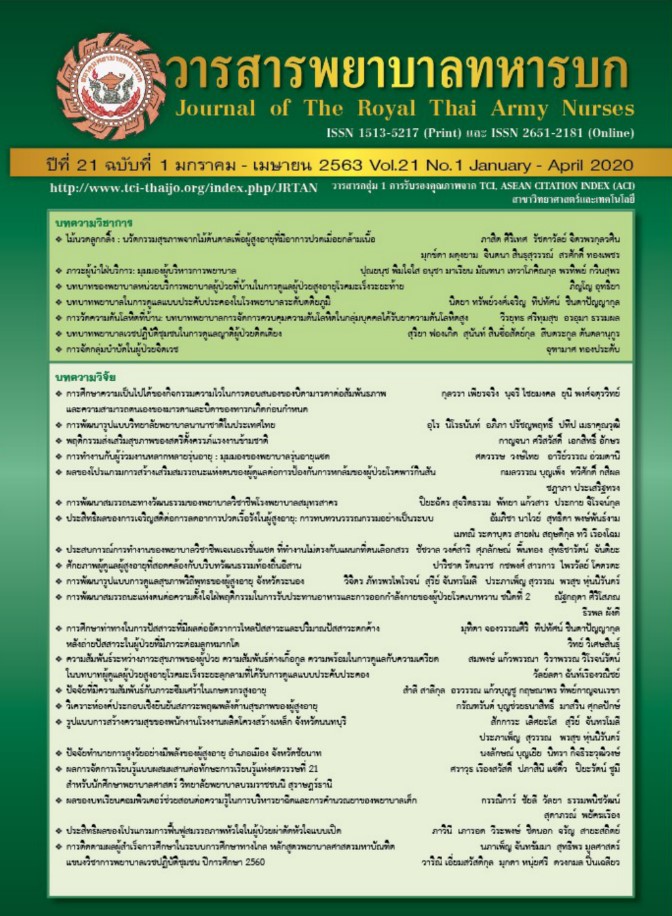Community Nurse Practitioner’ Role in Caring Family Caregivers of Bedridden Patients
Keywords:
Family caregiver, bedridden patient, Community Nurse Practitioner’ RoleAbstract
Caregiving to bedridden patients in family is set to become a major problem in future. As a family member who must to take a role of “Caregiver” for fulfilling the need of patient care at home. The data interviewing Caregives, in this article retrived from Suriya Fongkerd’study. It was called “The Self-Health Care Experiences Of Caregiver’s Older Adults With Bedridden Patients” (Suriya Fongkerd, 2019) The result found that caregivers must go for jobs to earn their living. Most of the times, caregivers at home and exclusive responsibilities lead to accumulative stress and deterioration of caregivers’ health as well. The effect of deterioration of caregivers’ health will affect the quality of care for bedridden patients. Therefore, bedridden caregivers are at risk that health personnel should pay attention and take into account. In this article, the author presents the factors that cause burn out caregivers. The effects of burn out caregivers will negatively affect bedridden patients. To understand the context of the burden caregivers who have direct experiences and stating fatigue, It is a challenge for community nurse practitioners who play a role as health promotion, support and management of health problems for both caregivers and patients who had limited care.
Downloads
References
Kasemkitwattana, S., Prison, P. Chronic Patients Family Caregivers: A Risk Group That Must Not Be Overlooked. Thai Journal of Nursing Council. 2014; 29(4): 22-31. (In Thai)
Hafsteinsdottir T B, et al. Education needs of patients with stroke and their caregivers: A systematic review of the literature. Patient Ed Counsel. 2010; 12: 1-10.
Younhmee K, & Ratche LS. Quality of life of family caregivers at 2 years after a relative’s cancer diagnosis. Psycho-Oncol. 2009; 19: 431-40.
Zarit, S. H., et al. Stress reduction for family caregiver: Effects of adult day care use. J Gerontol B Soc Sci. 1998; 53(5): 276-277.
Bakas, T., Austin, J. K., Okonkwo, K. F., Lewis, R. R., & Chadwick, L. Needs, concerns, strategies, and advice of stroke caregivers the first 6 months after discharge. Journal of Neuroscience Nursing. 2002; 34(5): 242-252.
Allison S, et al. Active carers: Living with chronic obstructive pulmonary disease. Int J Palliat Nurs. 2008; 14(8): 368-372.
Jean-Philippe, R. Ranjit, N, & Christopher C. Caregiver burden among nocturnal home hemodialysis patients. Hemodialysis Int. 2012; 16(2): 214-219.
Berg, D. The hidden client’ women caring for husband with COPD: Their experience of quality of life. J Clin Nurs. 2002; 11(5): 613-621.
Smith CE, Piamjariyakul U, Yardrich D M, Ross V.M, Gajewski B, & William A R. Complex home care: Part3-Economic impact on family caregiver quality of life and patients’ clinical outcome. Nursing Economics. 2012; 28(6): 393-414.
Fongkerd, S. The Self-Health Care Experiences of Caregivers Older Adults with Bedridden Patients. Journal of Boromarajonani College of Nursing, Surin. 2019; 9(1): 69-89. (In Thai)
Jung-Won L, & Zebrack B. Caring for family members with chronic physical illness: A critical review of caregiver literature. Health Qual life Outcome. 2012; 34: 147-156.
Brazil K, Bedard M, Willison K. Bereavement adjustment and support among caregivers. J Ment Health Aging. 2003; 9: 193-204.
O’Hara RE, Hull JG, Lyons KD, Bakitas M, Hegel MT, Li Z, Ahles TA. Impact on caregiver burden of a patient-focused palliative care intervention for patients with advanced cancer. Palliat Support Care. 2010; 8: 395-404.
Krairak, L., Prapaipanich, W., Monkong, S. Fatigue and fatigue management of family caregivers caring for older adults with heart failure post discharge. Thai Journal of Cardio-Thoracic Nursing. 2016; 27(2): 17-30. (In Thai)
Luvira, V. Health Care for Caregivers of Patients with Terminal Illness. Srinagarind Med Journal. 2013; 28(2): 266-270. (In Thai)
Hanyoot, O., Wongsariee C. Ethical Behavior for Professional Nurses. Journal of The Royal Thai Army Nurses. 2018; 19(3): 33-37. (In Thai)
Cooke, C. & Lyon, S. The Role of Nurse Practitioners in Health Care: Providing Patient-Centered Care Monthly National Briefing. NationalBriefing-Webinar-slides-Role-of-NPs-final. 2016; 15-18.
Bailes C; Kelley C; Parker N. Caregiver burden and perceived health competence when caring for family members diagnosed with Alzheimer’s disease and related dementia. Journal of the American Association of Nurse Practitioners. 2016; 28(10): 534–540.
Kanda M, et al. Effectiveness of community-based health services by nurse practitioners: protocol for a systematic review and meta-analysis. BMJ Open. 2015; 5(6): 1-4.
Sathira – Angkura, T., Haruthai, C., Leelawong, S.,Kladjompong, P., Janta-Um-Mou, U., Suwonkesawong, S., Srichairattanakul, J., & Manit, P. Nursing Curriculum Development to Promote Healthcare Self-management in
Patients and Caregivers. Journal of The Royal Thai Army Nurses. 2019; 20(3): 104-113. (In Thai)
Ponsawat, R. Lifelong Learning for Promoting Health Literacy among The Elderly in Thai Society. Journal of The Royal Thai Army Nurses. 2019; 20(3): 54-61. (In Thai)
Downloads
Published
How to Cite
Issue
Section
License
บทความหรือข้อคิดเห็นใดใดที่ปรากฏในวารสารพยาบาลทหารบกเป็นวรรณกรรมของผู้เขียน ซึ่งบรรณาธิการหรือสมาคมพยาบาลทหารบก ไม่จำเป็นต้องเห็นด้วย
บทความที่ได้รับการตีพิมพ์เป็นลิขสิทธิ์ของวารสารพยาบาลทหารบก
The ideas and opinions expressed in the Journal of The Royal Thai Army Nurses are those of the authors and not necessarily those
of the editor or Royal Thai Army Nurses Association.






